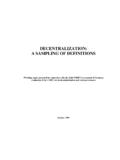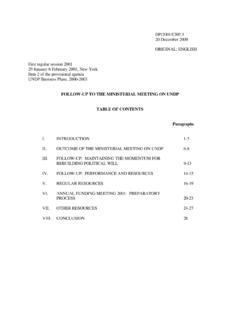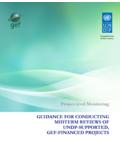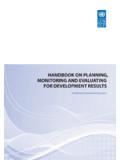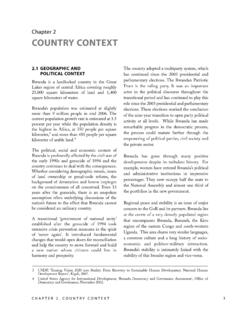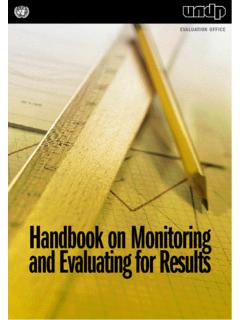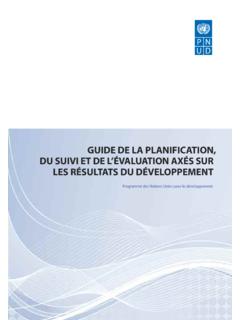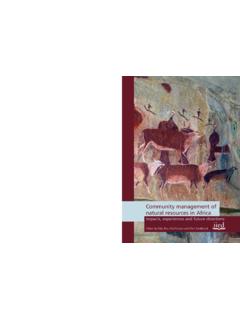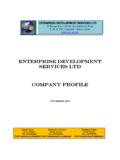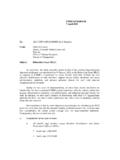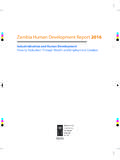Transcription of Evaluation of Gender Mainstreaming in UNDP
1 GENDEREOUALITYEVALUATION OF Gender Mainstreaming IN UNDPE valuation Office, January 2006 united nations development programme Copyright undp 2006, all rights in the united States of AmericaThe analysis and recommendations of this report do not necessarily reflect the views of the united nations development programme , its Executive Board or the united nations Member is an independent publication by undp and reflects the views of its :Suazion Inc., Bloomingburg, Office Supply, New York, NYTeam LeaderDr. Nafis SadikInternational Ayse AyataConsultantsMichael BambergerMarcia GreenbergAnnet LingenKalyani Menon SenRuth PearsonFatou SarrNational Rozetta Aitmatova (Kyrgyzstan)ConsultantsRania El Azem (Morocco)Imam Bibars (Egypt)Ondina Castillo (El Salvador)Marie Djuidjeu (Cameroon)Samra Filipovic-Hadziabdic(Bosnia-Herzegovina & Kyrgyszstan)Diana Urioste Fern ndez (Bolivia)Bernadette Kayriangwa (Rwanda)Darshini Mahadevia (India)Rama Samb (Senegal)Annie Serrano (Philippines)Svetlana Shakirova (Kazakhstan)Elizabeth Dzokai Shongwe (Swaziland)Barbara Watson (South Africa)
2 EO Task ManagerFadzai GwaradzimbaResearch Clara AlemannAssistantsMarianne GimonAdvisory Panel Feride Acar, Academic & Chairperson of CEDAW, Turkey MembersLeite Bjorg, former Head of Evaluation Department, NORAD and presently Norway s Ambassador to UgandaMary Chinery Hesse, Vice-Chairperson of the National development Planning Commission of Ghana and former Deputy Director General of ILOK eith Griffin, Economics Professor Emeritus,University of California, RiversideEVALUATION TEAM CONTENTSF orewordiiiExecutive SummaryvList of Rationale and and is Gender Mainstreaming ? Scope and of the Global undp and Priorities undp s Institutional Structure for Gender Mainstreaming The Gender Unit at Advisors and Focal Points at Regional and Country and Guidance Written and Human Monitoring and to Gender Equality in Human Resource Gender Mainstreaming in Practice Introduction21iCONTENTS Evaluation OF Gender Mainstreaming IN undp Poverty Democratic Energy and Crisis Prevention and Overall Conclusion on Integrating Gender in Practice Promoting Gender Equality: Advocacy and The Advocacy UN Gender Thematic Groups at Country UNIFEM and undp .
3 Differences and of Results of Electronic Survey of Country Offices53II Financial Tables62 IIIList of Persons Consulted67 IVReferences79 IVTerms of Reference: Gender Mainstreaming in UNDP85 VIEvaluation Team and Advisory Panel Members91iiEVALUATION OF Gender Mainstreaming IN UNDPCONTENTS FOREWORDThis report presents the findings of an independent Evaluation ofGender Mainstreaming in undp , undertaken in 2005. The mainpurpose was to take stock of undp s efforts to develop and implementgender Mainstreaming policies; and to assess the overall performance ofUNDP in Gender Mainstreaming and the promotion of Gender equality inthe last ten years. The Evaluation is primarily forward-looking, respondingto corporate concerns to increase the effectiveness of the organization sgender Mainstreaming policies and by governments, the united nations and civil society in the last 30years has produced international normative frameworks; acknowledgementthat women s rights are human rights and broad acceptance that genderequality is a critical and indispensable component of human , poverty, wars, health pandemics such as HIV and AIDS andthe impact of rapid globalisation continue to pose even greater challengesfor women.
4 In many parts of the world, the deficits presently outweighthe gains;progress in some areas is being many ways, the findings of this Evaluation mirror these trends. Theevaluation concludes that in the last ten years undp has put in place anumber of policies and strategies to mainstream Gender . However, a lotstill remains to be done: undp has not effectively and successfully engenderedits development programmes. While there are many committed individualsand some islands of success, the organization lacks a systematic approachto Gender Mainstreaming . undp has not adopted clearly defined goals,nor dedicated the resources necessary to set and achieve them. There is alack of systemic approaches, leadership and commitment at the highestlevels and of capacity at all implications of the Evaluation are that undp should reconsider itsapproach, if Gender Mainstreaming is to produce tangible and lastingresults.
5 The organization not only needs to establish a new and strongerinstitutional structure, but also to demonstrate leadership; articulate avision; set goals, benchmarks and performance standards at the highestlevels; and allocate core administrative and programme report is a result of many people s dedication and contributions. Weare deeply indebted to all the people who worked tirelessly under a verytight timeline to complete this Evaluation . First and foremost, the EvaluationiiiFOREWORD Evaluation OF Gender Mainstreaming IN undp Office is grateful to the Evaluation team, which wasled by Dr Nafis Sadik, former UNFPA ExecutiveDirector and currently Special Advisor to theSecretary-General and Special Envoy for HIV/AIDSin Asia.
6 Team members were: Ayse Ayata, MichaelBamberger, Marcia Greenberg, Kalyani Menon,Annet Lingen, Ruth Pearson, and Fatou Sarr. RuthPearson and Marcia Greenberg worked on the firstdrafts and Annet Lingen authored the final draft. Weare very grateful to all of them, especially Annet whoput in many hours of shaping and refining the text to bring it to its current state, and to Alex Marshall,editor of this international team was joined by a team ofnational experts: Rozetta Aitmatova (Kyrgyzstan),Rania El Azem (Morocco), Imam Bibars (Egypt),Ondina Castillo (El Salvador), Marie Djuidjeu(Cameroon), Samra Filipovic-Hadziabdic (Bosnia-Herzegovina & Kyrgyszstan), Diana Urioste Fern ndez(Bolivia), Bernadette Kayriangwa (Rwanda), DarshiniMahadevia (India), Rama Samb (Senegal), AnnieSerrano (Philippines), Svetlana Shakirova (Kazakhstan),Elizabeth Dzokai Shongwe (Swaziland), BarbaraWatson (South Africa).
7 The team also had at its disposal two excellentresearchers, Clara Alemann and Marianne Gimon,who were guided by the task manager of the Evaluation ,Fadzai Gwaradzimba, Evaluation Advisor in theEvaluation Toure and MaritzaAscencios provided administrative support andAnish Pradhan provided technical support with thepublication Evaluation also benefited from the advice of anadvisory panel of four senior experts drawn from theacademia and the public arena. We are deeplyindebted to Feride Acar, Professor of PoliticalScience and Chairperson of CEDAW, Turkey, LeiteBjorg,former Head of Evaluation Department,NORAD and presently Norway s Ambassador toUganda, Mary Chinery Hesse, Vice Chairperson ofThe National development Planning Commissionof Ghana and former Deputy Director General ofthe International Labour Organization (ILO)
8 AndKeith Griffin, Economics Professor Emeritus,University of California, but not least, I am very grateful to all undp colleagues at headquarters and country offices,members of the Executive Board and programmecountry officials who supported this Evaluation andfielded many questions from the team. Without theirinterest and involvement, the Evaluation would nothave been possible. I would like to single out forspecial thanks all the Resident Representatives andthe staff of the countries visited by the team, theDirector of Bureau for Policy development (BDP)and the Executive Director of UNIFEM and othercolleagues in headquarters units who provided vitalfeedback to the team and the Evaluation hope that the recommendations of this evaluationto provide leadership and strengthen the institutionalarrangements and capacity to engender undp sprogrammes will find resonance with undp s seniormanagement and staff.
9 Coinciding as it does withrenewed vigour to push the UN Reform agenda and the Millennium development Goals (MDGs)and,no less important,the 60th anniversary of theUN,I hope that this Evaluation will find a broaderaudience beyond undp and its Executive Board. Ialso sincerely hope that the Evaluation has provided abasis for deepening the positive lessons, overcominginstitutional obstacles and setting clear benchmarksfor tracking progress in the MenonDirector undp Evaluation OfficeivEVALUATION OF Gender Mainstreaming IN UNDPFOREWORD EXECUTIVESUMMARYRATIONALEAt its second regular session, September 2002, the Executive Boardrecommended that the Evaluation Office undertake a global Evaluation ofgender Mainstreaming in undp .
10 The present report provides the findingsof this Evaluation , carried out between December 2004 and June AND METHODSThe terms of reference were to assess the overall performance of UNDPin Gender Mainstreaming and promoting Gender equality, and to takestock of what undp has done to install Gender Mainstreaming policiesand ensure their implementation in the past ten evaluationused the definition of Gender Mainstreaming (ECOSOC 1997/2) adoptedcorporately by undp :..the process of assessing the implications for women and men ofany planned action,including legislation, policies or programmes, inall areas and at all levels. It is a strategy for making women s as wellas men s concerns and experiences an integral dimension of thedesign,implementation,monitoring and Evaluation of all policies andprogrammes in all political, economic and societal spheres so thatwomen and men benefit equally and inequality is not ultimate goal is to achieve Gender Evaluation accordingly addressed itself to the whole range of undp swork and assessed Gender Mainstreaming within the organization fromthe perspective that this implies.

